One of the most common financial means that is used by individuals for achieving various goals starting from buying a home to financing education are loans. However, even if loans are instrumental, they significantly impact your credit. But with appropriate credit protection education, you can cater to the risks that loans impose on your credit.
This short blog will help you identify the different kinds of loans, which affect your credit and some strategies that you can use for mitigating potential risks.
Different Types of Loans that Impact Your Credit
The different types of loans that impact your credit are:
- Mortgages: The Long-Term Credit Journey
Mortgages are the largest loans that an individual takes out in their life. Mortgages have a significant impact on your credit score, as even an application for a mortgage can cause a temporary dip in your credit score due to the credit inquiry that takes place. However, if you are properly aware of credit protection you can save your credit from this impact by making timely payments. This habit of credit protection will boost your credit profile over time.
- Auto Loans: Balancing Credit Impact
Auto loans are installment loans that have to be paid through regular payments over a set period. These loans positively impact credit score if managed responsibly. Therefore, with appropriate credit protection education you can ensure that auto loans positively affect your credit score. Credit protection education teaches the need for being concerned about the length of the loan, as longer time increases the interest rate, while increasing the period of credit monitoring.
- Student Loans: A Mixed Bag of Impact
Student loans are taken for education purposes, which also affects your credit. While typically student loans don't hurt your credit score, during deferment or grace periods they count as a part of your credit utilization when in repayment. With proper credit protection knowledge, you can mitigate this risk, as credit protection education makes you aware of the importance of making timely payments, income-driven repayment plans, and loan forgiveness options.
- Personal Loans: Managing Short-Term Needs
Personal loans also impact your credit as they are typically unsecured loans, which gives lenders the chance to scrutinize your creditworthiness closely. However, if managed properly, personal loans can improve your credit. But be cautious, as missed payments can damage your credit score. To mitigate this risk, you should stick to using personal loans only for essential needs and make a clear payment plan.
- Credit Cards: The Credit Double-Edged Sword
While credit cards are not loans, this significantly affects your credit. Credit cards impact credit utilization and payment history, which are the most important two factors in your credit score. But you can mitigate this risk by maintaining a credit card balance that is lower than your credit limit and by always making timely payments.
Tips to Mitigate Risks
For mitigating potential risks associated with the different types of loans some of the additional tips to consider are budgeting wisely, monitoring your credit, diversifying your credit types, and avoiding overborrowing. You can also get help from credit protection education services to understand how to mitigate the risk that different kinds of loans have on your credit.
Wrapping Up
There are different types of loans that you can avail of, these loans impact your credit in various ways.
But if managed responsively, these loans can positively influence your credit score over time.
However, you should be aware of credit protection to understand the potential risks associated with borrowing and to take proactive steps to mitigate them. Credit protection knowledge will empower you to budget wisely, make timely payments, and monitor your credit to maintain positive financial health in the long run.



